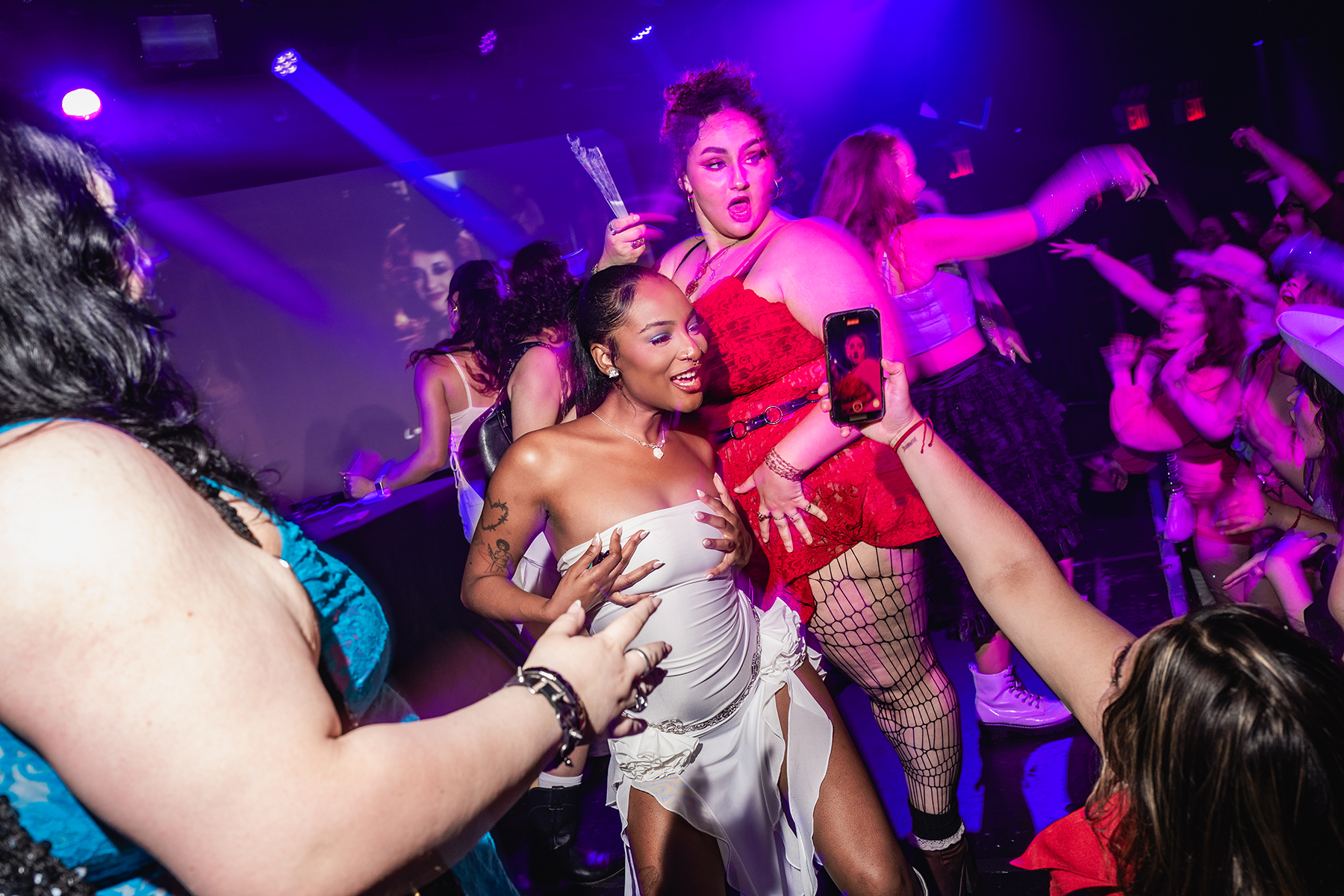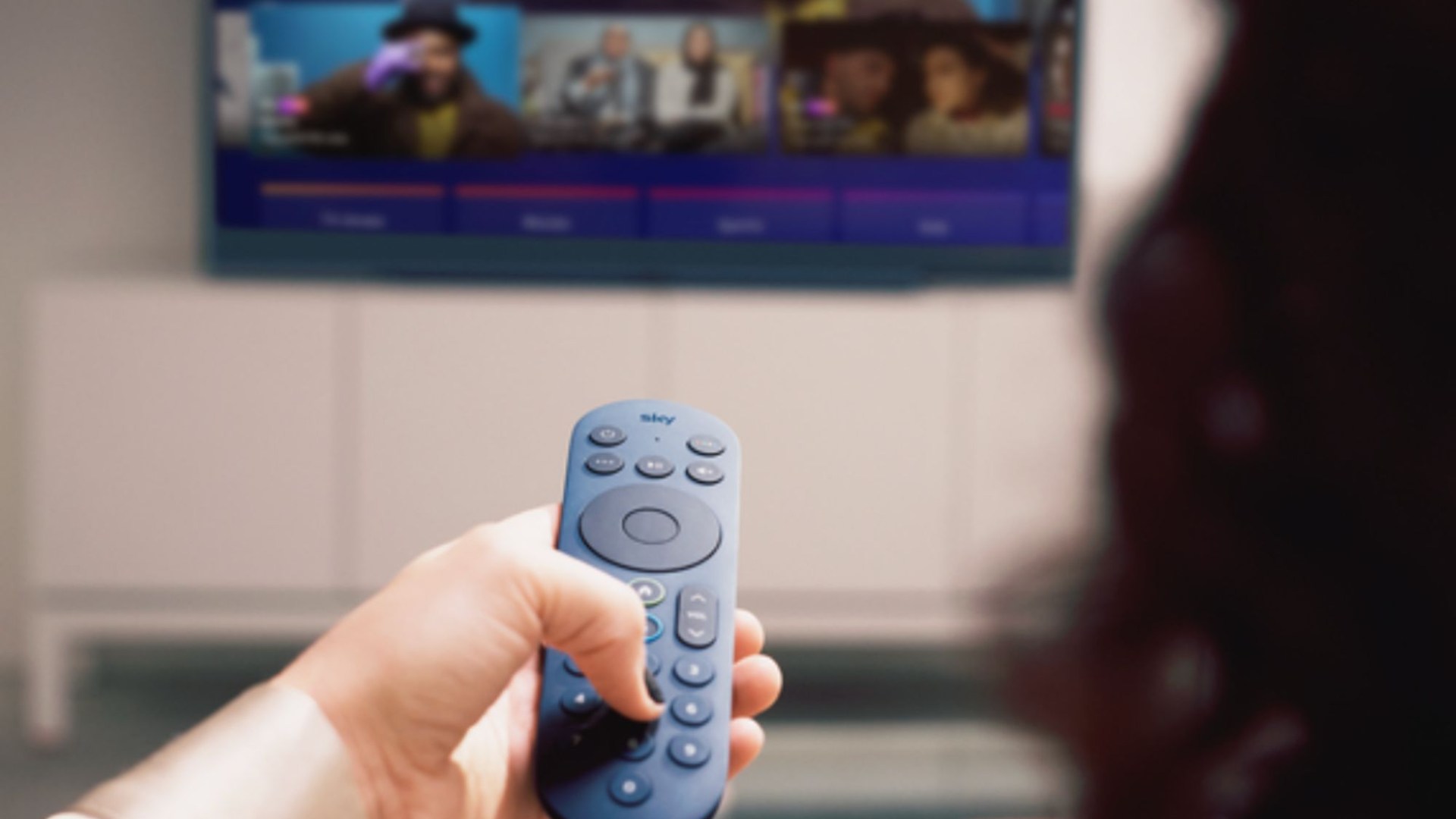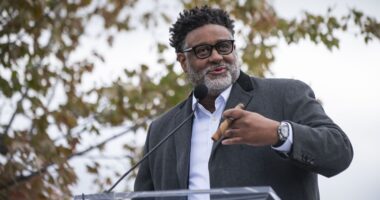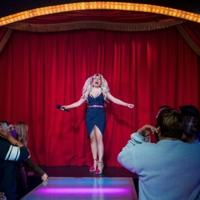Pink and blue lights dance off the mirrored disco ball that hangs from the ceiling of New York’s Le Poisson Rouge, illuminating the hundreds-deep crowd beneath it. It’s early in the night on the Sunday of Memorial Day weekend, only about 9:30, but the audience is already buzzing with impatience. “Um, can you play a song with a fucking beat?” the cluster of sparkling tiaras and glittering cowboy hats screams collectively, reciting the lyrics to “Femininomenon,” Chappell Roan’s anthemic single about the pitfalls of dating men.
There are seven people onstage leading the charge — though the singer herself is actually about 200 miles away, having brought in a similarly animated, though much larger, crowd to her festival set at Boston Calling a few hours earlier. Roan is present only in the spirit of the more than 200 fans who filed into the Greenwich Village concert venue for Pink Pony Club: Chappell Roan Night, a pop-themed party presented by the Los Angeles-based event organizer Club 90s.
For three and a half hours, DJ Katie Murphy spins a blitz of hits and deep cuts in celebration of the Midwest Princess, spending almost an equal amount of time mixing songs behind the booth as she does dancing with the fans that join her onstage. She looks the part, too, with glitter brushed across her body and lavender fishnet gloves climbing her arms. The crowd matches her energy, donning prom sashes, feather boas, and merchandise for everyone from Roan to Olivia Rodrigo and Taylor Swift.
One of Club 90s’ greatest acknowledgments came from Swift herself. “THIS is what it’s all about, why I live to make music,” the singer wrote on her Instagram Story in November 2021, sharing a clip of a room full of fans screaming “All Too Well (10 Minute Version)” at a Club 90s party. “The hope that maybe people might want to come together and feel things.”
Terall Miller, 24, makes his way to the stage a few times throughout the night, but spends most of the party dancing in a cluster of friends, the gems on his crown refracting the venue lights. “We kept joking around that it’s like a Met Gala because it’s our time to show ourselves, show our celebration, show our uniqueness, our creativity,” he explains, adding, “When we come to events like this — where it just doesn’t matter who you are, where you come from, or what color your skin is — it’s just people who want to be safe and celebrate and dance. I think that’s what it’s all about when you come to Club 90s parties. You don’t have to be afraid of anybody judging you or taunting you or being scared. It’s a very safe, free environment.”
For younger people whose connection with club culture was largely altered by the onset of the pandemic, these events set their expectations high. Club 90s parties typically bring out a young audience of primarily women and queer fans, two demographics with complex experiences regarding safety in the sphere of nightlife. “It seems like a lot of the people here have a lot of respect for the music,” says Ella Freeman, 19. “It certainly creates a nicer space as opposed to some other spaces, which can be a little bit unsafe or scary at times, depending on where you go. It can get pretty sketchy sometimes.” Britney Prince, 19, had never attended a Club 90s event before Chappell Roan Night, but made similar observations, noting, “It definitely feels like a safe queer space.” And the audience looks out for each other, too, inviting solo stragglers to join their groups and be best friends for the night. “We all understand that we got each other,” adds Destiny Moore, 21.
Before joining Club 90s a bit more than a year ago, Murphy adopted this ideology not as a DJ, but as a fan. While working as a private-school teacher, the 29-year-old would attend their Disney Channel Night, One Direction Night, Arctic Monkeys Night, and everything in between. The events — hosted everywhere from New York and Los Angeles to Honolulu, Raleigh, North Carolina, Denver, Salt Lake City, and other cities — center around a particular artist or theme, but feature music from adjacent acts when fitting.
“Any music that I knew, I would go and I was just the most excited person there,” Murphy told Rolling Stone backstage at Le Poisson Rouge at around 8 p.m., less than an hour before she was due onstage. Her enthusiasm caught the attention of Club 90s founder and primary DJ Jeffrey Lyman, who recruited her after she became a regular at events. “Jeffrey was unlike any other DJ that I’ve ever seen,” Murphy recalls. “The interaction with the crowd, the dancing all night — it was less ‘Here’s my DJ skill’ and more ‘This is for you guys.’”






Thank you so much for your kind words! I’m grateful to hear that my writing resonates with you. It’s incredibly rewarding to know that my honesty and authenticity are appreciated. Thank you for being a part of this journey with me!